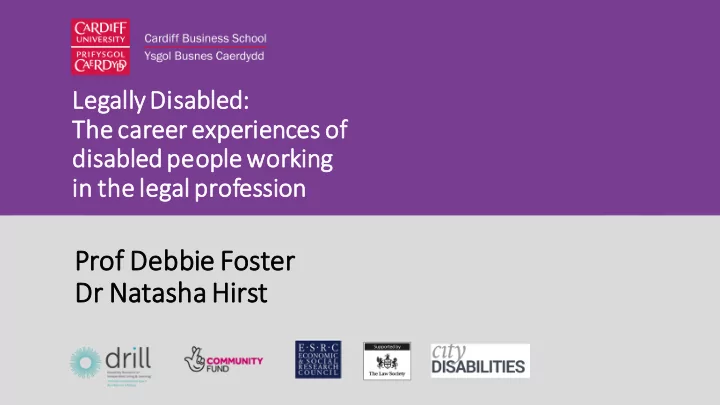

Legally Disabled: The career expe periences of disabl bled d peop ople wor orking in the legal prof ofession on Prof Debbie Foster Dr Na Natas asha Hi Hirst
Aims & Objec ectiv ives s of the e Resea earch ch 1. To establish the first comprehensive evidence on the experiences of disabled people working in the legal profession 2. To co-produce the research with disabled people so that their voices and priorities were fully represented 3. To challenge negative stereotypes and limited aspirations. To highlight untapped talent, unnecessary obstacles and work with stakeholders to bring about change.
Me Methodology 1. Co-production guided by the social model of disability – we worked with our partner(s), involving Disabled People’s Organisations (DPOs) & established a Research Reference Group (RRG). 2. 8 focus groups were held across England and Wales 3. Key focus group themes shaped the questions we asked in semi- structured interviews with 55 people 4. Analysis of interview data shaped our questionnaire. 288 people responded.
Key ey findin ings s
Di Disa sabil ilit ity, backg ckground & car caree eer asp spir irations • For those disabled in childhood, parenting and schooling were significant • Research identified a sub- group: ‘childhood litigants’, who had contact with the legal profession through personal injury or medical negligence (appeared to cut across socio-economic background) • Largely positive experience in terms of accessibility and adjustments at University
Secu curing train ining and employment • 66% of barristers and 59% of solicitors/ paralegals surveyed were disabled when they started training. • Those identifying as disabled at the point of application reported being most disadvantaged when applying for training or employment. • Only 9.7% of disabled solicitors/ paralegals reported a positive and supportive response when using legal recruitment agencies . • Fewer than 7% found it easy to find out about the accessibility of a prospective employer. • 60% were concerned that inaccessible working environments limited their opportunities. The comparable figure for barristers is 50%.
Our data found • Over 90% of survey respondents had a non-visible impairment. • Only 50 - 60% disclosed their non-visible impairment when applying for training/ jobs / tenancy. The majority that could not conceal a visible impairment still concealed a non-visible impairment. • Many disabled people do not realise their full potential because of fears of requesting adjustments or receiving partial adjustments. • In anonymous equality monitoring surveys, only 60% of solicitors / paralegals declare they are disabled and the figure is 55% for barristers.
Caree eer paths and progress ssio ion Career paths in the legal profession are more precarious and unpredictable for disabled people because of barriers such as: • Accessibility and location of premises • Rigid working practices that failed to facilitate reasonable adjustments • Health-related (sometimes unnecessary) career interruptions • Expectations of physical networking • Unnecessary ‘essential criteria’ • ‘Misplaced paternalism’
Caree eer progres essio ion and advance cement 56% of solicitors/ paralegals surveyed and 71% of barristers believed • they did not have the same opportunities for career progression as their non-disabled colleagues. "When you try and meet the criteria there's no obvious path to get • you there... And I think one would have to pursue a completely different and unusual route to promotion to partnership..." "There's no role model that I can see for somebody who's been • promoted to partner in my position, you know, somebody who isn't able to travel."
Di Disa sabil ilit ity and workin king pract ctice ces Disabled people reported they required more tailored, flexible, remote • working and imaginative job design. 85% of disabled solicitors and paralegals surveyed reported pain and • fatigue. Disabled people frequently reported experiencing an organisational • reluctance to adapt, reform, listen, or address exclusionary practices Under-utilisation of Access to Work • Billable hours place many disabled people at a substantial disadvantage. •
Ill-treatment, bully llying & discr crim imin inatio ion • 60% of solicitors and paralegals had experienced ill-treatment in the workplace and of these 80% believed it was related to disability. • 45% of barristers surveyed reported having experienced ill-treatment and 71% of these believed this was related to disability.
Ill-treatment, bully llying & discr crim imin inatio ion Common experiences: • Ridiculing or demeaning language (40% solicitors / paralegals; 60% barristers) • Exclusion or victimisation (47% solicitors / paralegals) • Over 53% of solicitors/ paralegals and 35% of barristers classified their experiences as discrimination • Over 80% of all groups surveyed reported experiencing ‘poor attitudes/ lack of understanding towards an impairment or health condition’.
The e role le of disa sable led people le's networks “Nothing about us without us” • The individualisation of workplace adjustments can ‘ privatise ’ disability • Shared collective experiences, practical knowledge, belongingness are advantages of DPOs • Need for the profession to integrate DPOs into all diversity decision-making
Posit sitiv ive e exp exper erien ences es "Visibility of other disabled people in the working environment" "Presence of diversity networks" (more than half of those surveyed did not have access to a disability network) "Sharing experiences of disability and work in the legal profession" "Access to mentors and participating in a reverse mentoring scheme"
The e Report Please access and share the full report and executive summary, which can be found at: http://legallydisabled.com/research-reports/
Co Co-productio ion Jane Burton, Chair of the Lawyers with Disabilities Division
Recommend
More recommend